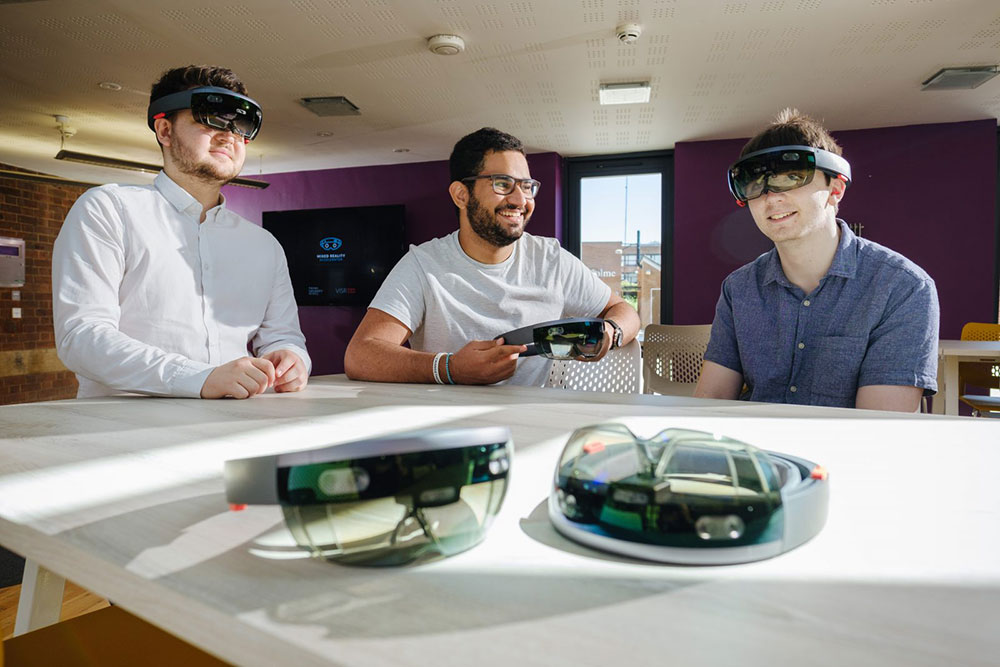A new Mixed Reality Accelerator that will help companies such as Audi and Centrica use Microsoft HoloLens to transform how they work, has been launched at the University of Hull.
The venture will see some of the university’s brightest students use Microsoft’s headset, which places holograms in the real world, to solve problems for the businesses.
Companies such as car maker Audi, energy supplier Centrica and AB InBev – the world’s largest brewer – hope to use the HoloLens solutions to assist their workers and improve communication, efficiency, safety and product quality.
Rather than place users in a fully computer-generated world, as virtual reality does, HoloLens allows users to put 3D digital models in the room alongside them. As the Windows-10-based wearable computer does not have wires or external cameras, or require a phone or PC connection, users can walk around the objects they create and interact with them using gestures, gaze and voice.
It is being used by companies to hold virtual meetings, as well as by police forces, paramedics and universities training nurses, among others.
Microsoft is a partner in the programme, which will also feature computing company VISR.
Leila Martine, Microsoft’s Product Marketing Director, said: “The launch of the Mixed Reality Accelerator by the University of Hull and VISR is a landmark programme that is specifically designed to enable enterprises to fast-track the adoption of new technologies.
“In this era of profound digital disruption, the majority of industries will experience significant change within two years. It is therefore vital that technology partners and universities come together to create a streamlined approach for the creation of meaningful proof of concepts, which can be quickly tested and return-on-investment validated in a way that can then be taken forward by an organisation and integrated into their existing business processes.
[youtube https://www.youtube.com/watch?v=EIJM9xNg9xs&w=686&h=550]
“The University of Hull and VISR’s Mixed Reality Accelerator is a clear example of this and is a genuinely important partnership as it brings together Microsoft HoloLens, VISR’s VERTX, our Azure Cloud platform and the best and brightest university students, with the express purpose of working with world-class enterprises on real challenges. As a result of the programme, I expect to see groundbreaking spatial computing experiences with demonstrable impact.
“Critically, the practical digital skills training that University of Hull students receive will not only help their employability prospects, but also ensure that UK companies get state-of-the-art talent to transform the way we create, collaborate and explore in the future.”
The Accelerator will be based at the University of Hull’s Enterprise Centre and run for nine weeks from June 18. Twenty-four students studying subjects including computer science and engineering will take part, using VISR’s VERTX platform on HoloLens to create solutions. The companies will then take HoloLens back to their staff to use in real-world situations.
For example, a mechanic who wants to repair a vehicle in his company’s workshop can use HoloLens to see a digital model of the task in the air above the car and a central computer has already ordered the parts he needs. Step-by-step instructions will appear on his HoloLens screen and when he’s finished, the device logs what he’s done.
Gus Carroll, Chief Engineer at Centrica, said he saw “great potential for HoloLens technology in terms of driving operational excellence.”
Companies across the world are increasingly turning to technology to transform how they function. Market intelligence firm IDC has predicted the virtual reality and augmented reality sectors will record global revenues of more than US$162 billion in 2020 – up from US$5.2 billion in 2016.
Louis Deane, Co-Founder of VISR, which became one of only a handful of digital firms to join Microsoft’s Mixed Reality Partner Program status earlier this year, said: “The shift we are going to see as a result of this technology over the next 10 to 15 years is going to be astronomical. We are running this programme to allow a group of carefully selected companies to be first to grasp the opportunity this technology represents by creating proof of concepts that could literally transform human existence.”
Following the launch of the Accelerator, the University of Hull will embed spatial computing modules involving HoloLens and VERTX technologies into its courses. This will help train the next generation of computer programmers who will create new applications for HoloLens in the real world.
John Hemingway, Director of ICT at the University of Hull, said: “HoloLens can assist frontline workers in companies, as well as those who create and operate products, machines and spaces who need their hands free to do their work.

“It can enable employees to collaborate with each other and communicate with customers, sharing what they see with heads-up, hands-free video calling, image sharing and mixed-reality annotations, using whatever device they are using at the time, including PCs, phones or tablets. They can even annotate their shared view with mixed-reality ink and arrows or insert images. This can help firms get things right first time, operate more efficiently and expedite troubleshooting, while also saving on travel and downtime.”
HoloLens is available in 39 countries and can be bought directly from Microsoft or as part of a subscription programme in certain areas.
Click below to share this article

